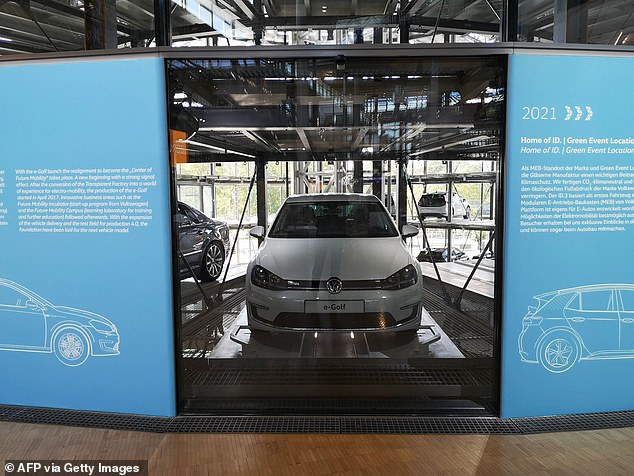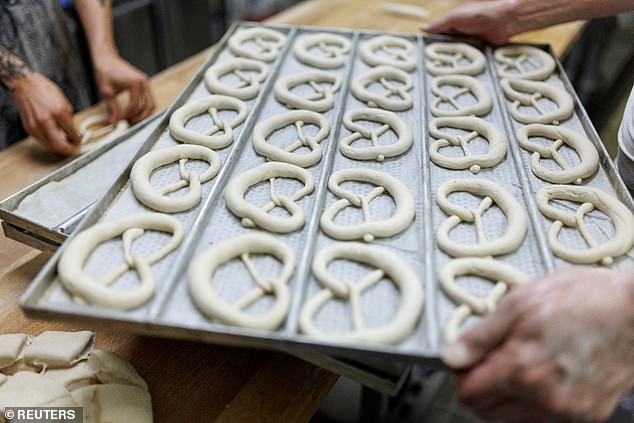Germany’s ‘bleak’ economy is now ‘treading water’ with key business confidence barometer sliding for the fifth time in a row – days after country’s production fell for third straight month
The ‘gloomy’ German economy is now ‘treading water’ after business morale deteriorated for the fifth month in a row, amid growing fears of a double-dip recession.
Although business confidence fell less than expected in September, a key survey on Monday showed it was a fifth straight decline, days after the country’s output fell for the third month in a row.
It comes as Europe’s largest economy struggles to recover from a recession.
The Ifo Institute’s closely watched confidence barometer, based on a survey of 9,000 companies, fell to 85.7 points, down from 85.8 points the month before.
Analysts polled by financial data company FactSet had expected a sharper decline, at 85 points, a small positive for the ‘sick man of Europe’.
The ‘gloomy’ German economy is now ‘treading water’ after business morale deteriorated for the fifth month in a row, amid growing fears of a double-dip recession. In the photo: German Chancellor Olaf Scholz gives a speech in Hamburg, September 25
But “sentiment in the German economy remains gloomy,” said Munich-based Ifo President Clemens Fuest. ‘The German economy is treading water.’
The survey found that companies were slightly less pessimistic than in August about the prospects for the coming months, but more gloomy about their current business situation.
The mood was especially grim in the construction sector, where the confidence index fell to its lowest level since 2009 as higher interest rates and rising material costs take their toll on the housing market.
The crucial German manufacturing sector, hit hard by weaker foreign demand and higher energy costs, also remained pessimistic as order books continued to shrink.
The Ifo reading is the latest in a series of gloomy figures for the German economy, which entered a recession at the beginning of this year and stagnated in the second quarter.
The European Commission said earlier this month that it now expects the German economy to shrink by 0.4 percent this year, down from a previous forecast of 0.2 percent growth – while industrial production fell for the third month in a row in July .
Production fell by 0.8 percent compared to the previous month, according to seasonally adjusted figures from the statistics agency Destatisafter a decline of 1.4 percent in June.
By comparison, June estimates say the United Kingdom included a 1.8 percent increase in manufacturing output, the country’s strongest monthly growth by Index of Production (IoP) since August 2020, when a 1.9 percent increase was recorded.

Although business confidence fell less than expected in September, a key survey on Monday showed it was a fifth straight decline, days after the country’s output fell for the third month in a row. In the photo: a car factory in Dresden
Also in September, a German economic research group announced that it was sticking to its forecast of negative GDP growth for Germany in 2023.
The International Monetary Fund has predicted that Germany will be the only major advanced economy to shrink in 2023.
The Ifo Institute’s head of surveys, Klaus Wohlrabe, said a contraction in the third quarter was likely, after stagnation in the second quarter.
The German economy is expected to slide into a second recession in a year, after contracting in the last quarter of 2022 and the first quarter of 2023.
“German companies, as well as politicians and the entire economy, are gradually getting used to the idea that the economy is in for a longer period of moderate growth,” said Carsten Brzeski, ING’s global macro head.
He said the Ifo reading showed an unchanged economic picture, with China’s economy still not gaining momentum, high interest rates weighing on activity and continued policy uncertainty regarding the energy transition.
Companies were less satisfied with their current business situation in September than in the previous month, with the subindex falling from 89.0 in August to 88.7 in September.
“The Ifo confirmed that the German economy is extremely weak,” said Franziska Palmas, senior economist at Capital Economics.

The European Commission said earlier this month that it now expects the German economy to shrink by 0.4 percent this year, compared to a previous forecast of 0.2 percent growth – as industrial production fell for the third month in a row in July .
The current conditions index, which has a better relationship with gross domestic product than the business environment index, now suggests output is down about 1% quarter-on-quarter, Palmas said.
“With real household incomes set to flatten in the coming quarters and manufacturing and construction facing a sharp decline in new orders, we expect a further decline in GDP in the fourth quarter,” she said.
However, corporate pessimism about the coming months faded somewhat, with the expectations sub-index recovering slightly to 82.9 from 82.7 in the previous month.
The survey found that sentiment among German managers in the services and construction sectors continued to deteriorate, while it rose in industry and trade
